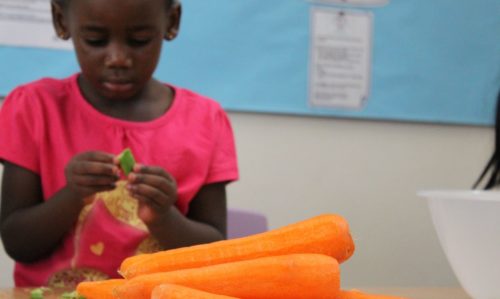Exploring the problem of “holiday hunger”, Wendy Eades explains how increasing numbers of parents are struggling to afford the meals that their children eat for free during term-time.
“Is there any more chocolate pudding?” Two children held their bowls up hopefully, looking like 21st century versions of Oliver Twist. It was summer 2014 and I was running a MakeLunch kitchen at a primary school in Coventry for two weeks during the summer holidays.
My church meets in a school hall in an area where a lot of parents struggle to feed their families during the school holidays. After deciding I wanted to do something to help, I joined MakeLunch, a charity which co-ordinates a network of over 100 kitchens throughout England, Scotland and Wales. I assembled a small but enthusiastic team of volunteers to cook the meals and applied for a micro-grant from Tearfund, a national Christian charity, to buy food.
Having worked at the local children’s centre for nine years, I was well known by the school and they were keen to support the project. The headteacher gave me free access to the school’s new, state-of-the-art kitchen and the school hall, and the school’s learning mentor helped recruit families from disadvantaged backgrounds (defined as those who received Pupil Premium funding).
I decided to invite the whole family to take part, rather than just school-age children, to give them the opportunity to sit down and eat together. Research shows that this is beneficial for children and young people in terms of their nutrition, their physical and social development, and their opportunities to talk to each other.
From my experience in children’s centres, I also knew that families needed more than just food in the long summer holidays. The main problem that these families face is the lack of free or cheap activities for children, and boredom creates additional stress when money is tight.
I planned a full programme of activities for a wide age range, including crafts, football and even a Frozen singalong, with support from the nearby children’s centre, my team of volunteers and the school’s learning mentor. The local housing association also funded the hire of a bouncy castle and provided drop-in surgeries to give financial and housing advice.
Working with the school, I signed up 80 parents and children for six days across two weeks – there were so many who were on Pupil Premium that we had to restrict families to coming for a maximum of three days.
Forty parents and children turned up on the first day, slowly dribbling in to the school hall or disappearing outside to play football or games on the playground. The first week was blisteringly hot, but we still served a cooked meal for lunch every day – from Chinese stir fry to vegetarian meatballs to ‘muffin pizza’.
I decided to invite the whole family to take part, rather than just school-age children, to give them the opportunity to sit down and eat together.
We followed the new School Food Standards, restricting salt and sugar and offering a choice of dishes, and we learnt from experience what the children’s tastes were (chocolate pudding was definitely the favourite, vegetarian dishes were less popular). The meals went down surprisingly well, and the scheme fed as many as 60 parents and children each day over the course of the two weeks. Many took home cartons of leftover meals.

We still had some funding left, so I ran another kitchen in the following February half-term. This time, I involved a local energy advisor, who was able to help families save money on their fuel bills – one single parent saved over £100 by switching supplier.
The children’s centre persuaded me to run a final scheme in summer 2015. We had to use their building, as the school was unavailable. This was a much smaller venue, although with a big kitchen. Only a small group of families came, probably because it was further away from the school and they were unfamiliar with the building.
At that point the money ran out, my research schedule increased and I decided to call it a day. Overall it was a positive experience and worthwhile for the families who participated. They were able to have at least one nutritious meal a day, enjoy free activities and also get advice and support if they wanted it. But it proved difficult to recruit a regular team of volunteers to staff both the kitchen and the activities. I was left wondering what would happen to those children and their families in future school holidays.
The bigger picture
The problems I found in Coventry exist up and down the country. The Department for Education reported that almost 1.5 million children in the UK were eligible for/claiming free school meals in January 2016.
During the holidays, children aren’t receiving any food at school but families don’t get any additional help. Spiralling food costs mean that providing meals in holidays can add at least £10 per week per child to household costs. A 2015 survey of 580 parents with incomes of £25,000 or less found that six out of ten parents weren’t always able to buy food outside of term time, and a third said they’d skipped a meal so their children could eat during the school holidays.
Other researchers have found that the additional cost of feeding a family of four during the holiday period has resulted in many low-income families adjusting their shopping habits by buying less expensive food that is often laden with salt, fat and sugar because it is perceived as being more filling and better value for money than healthier options.
There are many people trying to address this problem. A recent report by Northumbria University identified 428 different holiday projects in the UK, 78% of which also provide food. They are generally run by volunteers on a shoestring budget in schools, leisure centres, church halls and children’s centres. Some use surplus food provided by supermarkets, others use food donated by the public.
The Trussell Trust has just begun to pilot Holiday Clubs. They introduced these in five foodbanks during the Easter holidays, supporting 236 people, and plan to run 14 clubs over the summer across the UK. They aim to extend it to 50 food banks over the next two years, funded by the the Innocent drinks company’s UK charity, Innocent Foundation.
These schemes ensure children receive some healthy and nutritious food during the holidays. And the activities that accompany the food are just as important to the success of these schemes. They bring opportunities to increase participation in physical exercise, which is shown to be just as important to children’s development as the right diet.
Public health research into the impact of holiday food provision found that families benefit from more than just food and activities – the schemes help reduce social isolation and increase learning. They help parents stay in employment and could lead to a reduced demand for other forms of food aid during the holidays (a period when many food banks report an increase in uptake). But the schemes that exist are not nearly enough to help all the children who need them.
What more can be done?
Jamie Oliver helped bring the issue of holiday hunger back into the public eye in November 2016, when he talked to parents who were struggling to feed their children during the school holidays on his Channel 4 show. This was picked up by national media and Oliver was quoted suggesting that school kitchens open during the holidays, staffed by volunteers, using food waste from supermarkets to provide meals at low cost.
He argued: “We don’t need a new anything. It’s here, right under our noses … there’s nothing new required here”. He called on teachers, parents and MPs to work together to solve the problem.
Jamie Oliver’s intervention was a valuable call for action. But it certainly wasn’t the first. The All Party Parliamentary Group (APPG) on School Food launched the Holiday Hunger Task Group in 2014, in an attempt to highlight the problem and map examples of different types of holiday schemes.
In 2015, the APPG called for all UK government regions to fund resources and training for organisations to deliver and support new and existing holiday provision programmes; to research the scale of child hunger in the UK and its effect on learning; and to establish policy to support holiday provision programmes including meals and enrichment activities.
So far, only the Welsh Government (Food and Fun Clubs) and the Mayor’s Fund for London (Kitchen Social) have responded positively. There has been a deafening silence from central government. A number of campaigning groups are starting to demand that more action is taken. For example, End Hunger UK are calling for people to meet with their MPs during July to talk about holiday hunger, to build a groundswell of pressure on politicians and government.
That pressure is needed because voluntary action alone is not enough. The current reality is that in poorer areas volunteers are in short supply and school staff are likely to be exhausted from teaching and supporting pupils with a wide range of emotional and behavioural issues. Finding sufficient volunteers and resources for the activities that accompany the food provision is likely to be more difficult than organising a team of volunteers to cook. Volunteers need confidence and organisational skills, as well as being police checked.
I am seeing the difficulties of making schemes work in my own city.
Also, the prospect of damaging cuts to school’s basic funding is likely to prevent schools from offering access to their kitchens, which may be the domain of an external company cooking for a group of schools. Other schools will no longer have facilities suitable for providing hot school meals.
I am seeing the difficulties of making schemes work in my own city. Through ‘Feeding Coventry’ I am again involved in initiatives to feed children in the school holidays. Feeding Coventry is a multi-sector group organised by Coventry City Council, aiming to end food poverty by 2020. Last year city council provided small grants of a few hundred pounds to six summer holiday schemes in deprived areas. But the current financial position of the council means that new sources of support will need to be found if the funding is to continue.
This is part of a wider problem – the gradual demise of local services for children and young people that used to be funded by local authorities. Many years ago, as head of children’s library services in Coventry, I chaired a committee to publicise all the activities provided free of charge for children and young people across the city – we had difficulty fitting them into a 30-page booklet. As a result of substantial cuts to Coventry City Council’s funding since 2010, very few of those activities remain and for those that do, there is usually a cost, or families have to travel to access them.
Article 27 of the United Nations Convention of the Rights of the Child states that every young person has the right “to a standard of living adequate for the child’s physical, mental, spiritual, moral and social development”. It places the government under a duty to provide “material assistance and support programmes, particularly with regard to nutrition”. Why should we leave that provision to voluntary organisations, reliant upon the involvement of food companies and having to use food “waste” to feed the next generation? Why should children and families in poverty have to rely on the largesse of the business community for what should be a basic human right in the world’s fifth richest economy in the 21st century? Shouldn’t we hold the government to account for its failure to prioritise the needs of those for whom “school’s out” means “going without”?
Photographs from MakeLunch.
